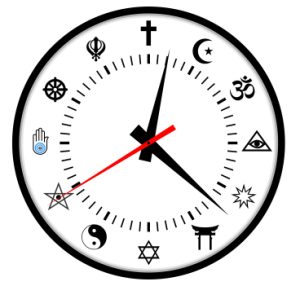Multicultural proficiency exists not only in race, age, gender and culture, but also within the confines of religion and spirituality. Counselors working in grief or merely spirituality need to be well versed in the multitude of spiritual beliefs that may exist within a particular person or target population. In many cases, religion and spirituality can play a key role in the grieving process, as well as emotional and mental outlooks. Many individuals tied to some world view are better able to find meaning in loss and religion and spirituality can be a great tool in helping clients find resolution and peace. Religion and spirituality can also sometimes be a double-edged sword and also cause conflict and stress with outcomes and faith. Regardless, counselors need to be able to understand the importance of faith, religion and spirituality in a client’s life because whether a counselor has a particular belief or any belief at all does not matter when it comes to helping a person who may.
Role of Faith

Many secular counselors trained solely within the confines of modern psychology and behavioral studies especially from numerous schools of Freud may be hostile to faith and see faith as a neurosis to the mind (Pedersen, 2018, p. 480). Despite this, the value of the religious experience, whether believed by the counselor or not, is an important aspect of the wholeness of the person and the person’s emotional well being. Even William James understood the importance of the religious experience within the mind, and other prominent humanist psychologists such as Carl Rogers and Victor Frankl understood the value of spirituality for a person (Pedersen, 2018. p. 480). Modern counseling demands a counselor’s proficiency with multicultural issues such as spirituality, faith or religion.
Faith is a universal human experience that spans across all of humanity. Spiritual and religious beliefs play a key role in all cultures in every aspect of health, life and death (Pedersen, 2018, p. 478). While within the United States there has been a drop in religious and church attendance, this decline is supplemented in other areas with individual spiritual practices. Even said, the dominant culture within the United States still holds true to a Judeo-Christian background that reflects itself in cultural norms even for some of the most anti-religious people. In the United States alone, a 2007 Gallup poll listed that 86 percent of Americans believe in God and another 55 percent still pointed out that religion is still important to them (Pedersen, 2018, p.478). Hence it is important not to dismiss the importance of faith and religion in counseling.
Yet even within this innate spiritual pursuit, there still remains a high level of diversity within religious individuals. The United States exists in itself as a melting pot of creeds. Christianity is far from monolithic but a diverse population of Catholics, Orthodox and various Protestant denominations which can range from very structured to very charismatic and individual. Beyond Christianity, exists numerous faiths not from the dominant culture, including Judaism, Islam, Hinduism, Buddhism and various smaller religious sects, as well as pantheistic creeds. If one then also considers some individuals are more spiritual than religious and follow a myriad of concepts, then one can find almost any combination of spirituality that may exist within a client. Some may be more dogmatic and religious, while others may be more spiritual and less defining, or one may be a combination of the two.
Within this diversity of faith also comes various different paths of thought. Spirituality, according to Pedersen, is a commitment to choose a context to understand and act within one’s relationships with all that is, whether within confines of person and creator, or between community, or nature itself. It is an awareness of something more in this world. It includes values that guide one’s meaning of life, sense of mission and how to help others for a better world (Pederson, 2018, p. 480). Many individuals share these similar views but express them in multiple different ways. In addition, religion, the social and dogmatic mechanism of the person provides the means and methods within the religious group (Pedersen, 2018. p. 480). In this day and age, one constantly hears the term “I am spiritual but not religious”. This points to this less dogmatic binding life style. Within these differences alone exist a multitude of different spiritual as well as religious ideals about God as a being, a source of being, or an infusion and connection within all humanity. A transcendent God reflects to a person a very ordered moral code of not only obedience but also justice. In more immanence theology, God exists literally within all and plays a part in all. This does not dismiss a moral code but it is far less dogmatic and refers more to a balance of life. These different theological concepts of God as one, many, transcendent or immanent, all play key roles in how a person morally acts and responds to many issues in life.
Spirituality in Counseling
In settings where Spiritual Counseling or Christian Counseling, or Spiritual Direction is not expected, such as within pastoral settings, one may seem from a professional or secular view anxious about discussing faith and religion. In the secular and professional world, religion is a question that is usually best left avoided. When asked to discuss religion or spirituality, many feel as if they may offend others, or be judged, or that faith is personal, or that one seems less academic (Pedersen, 2018, p. 478). The reality is faith plays a key role in a person’s life and hence plays a key role in healing, coping, finding meaning in loss, and facing adversity. Counselors, whether religious, atheistic or agnostic, should not dismiss the valuable part of the client to help one find healing. In fact counselors, like in all multicultural proficiencies, should take into account their own religious background and potential biases before helping someone of a different spiritual or religious background.
In addition, the counselor should attempt to help guide the client by understanding the client’s religious and spiritual background. Within the first interview, spiritual questions should be an important element of understanding the client. A spiritual genogram should be conducted which looks to examine religious and spiritual family history to analyze any cross section impacts upon the mind of the person (Pedersen, 2018, p,489). In addition, the client should be asked about questions regarding identification with religious groups, one’s perception of God, or special spiritual and religious beliefs one may hold. In addition, the counselor should attempt to discover if any life styles or actions may contradict one’s moral code and way of operating. Counselors can also ask what gives life meaning, the importance of one’s faith in life and healing, as well how the religious community can be helpful in one’s healing. Finally, counselors should ask if clients wish to address these spiritual issues moving forward (Pedersen, 2018, p. 488).

Counselors working with particular religious groups, especially those of a smaller religious community, such as Native Americans, or Asian Americans, may find the need to address healing and spirituality from the client’s perspective by working with local religious authorities within that group. If the client wishes, a joint healing model can be placed into action with conjunction with the client’s spiritual community.
Sometimes, religion can be a powerful anchor of meaning for the individual but sometimes, faith can also cause issues within a person’s life. When tragedy strikes, individuals may question their faith and lash out against God. They will doubt their faith and question meaning itself. Some may reject faith, others will turn to it more. Some may see their faith as a contract if left unfulfilled by God, they may terminate, while others may find God as a source of strength and covenant in suffering. Others within other dogmatic and strict denominations, may see faith as a block to their expression and look to free oneself from the morality the faith of one’s parents taught oneself. Others on the other hand, may feel extreme guilt if their moral actions contradict the morality of faith and the teachings of it. Many LGBTQ individuals who are spiritual and wish to hold to their faith can find one of these two reactions within Christianity, where their faith either torments and guilts them regarding life style or pushes them into total rejection of it or at least adjustment of their personal moral paradigm. Fukuyama in the Pederson text rightfully points out that religion and spirituality can be functional or dysfunctional when it comes finding solutions (2018, P. 489). This is very important for the counselor to identify when helping someone through moral issues, suicide, or other social issues that affect religious individuals. Is the spirituality properly function to help the person find meaning, or is it instead a sick faith that is tormenting and guilting the individual to a point of pathology? Spiritual Directors work with others in a pastoral capacity and help use healthy spirituality to guide those who seek guidance, but sometimes, they even need to identify spiritual pathology that corrupts. Scruples, guilt, torment, anger towards God, or unhealthy compliance to the Will of God as a way to escape the situation, are all examples of when spirituality can become dysfunctional. Unlike spiritual directors, counselors however are called not to give moral direction or dictate what moral code is right but instead to determine if spirituality is healthy or unhealthy in a particular situation and help the client heal.
Conclusion
Spirituality and religion are not opiates of the people. They are important elements of what it means to be human. When properly in tune, spirituality and religion can play key roles in helping individuals find meaning and guidance. However, when spirituality becomes dysfunctional it can also become a problem for the person’s ability to cope or heal. Since spirituality and religion is important, counselors need to be culturally aware of faith and religion and the target population they are working with. Regardless of the counselors own beliefs or lack thereof, counselors need to respect spirituality and discuss it in a healthy and non biased way. Spirituality and faith are a key aspect of understanding the client and is a key element of multicultural counseling. Utilizing it properly in counseling can be a great benefit, but one must like in all cultural aspects understand that diversity exists within spiritual and religious persons and not every treatment or intervention serves one best over the other. Individuals may be spiritual but not religious, or a combination, or have a myriad of different religious beliefs within their family history. These all play unique roles in forming the person before the counselor. These religious and spiritual beliefs will also play a key role in how many clients see the world, react to it and heal from it.

Please also review AIHCP’s Spiritual Counseling Certification as well as AIHCP’s Christian Counseling Certification. The Spiritual Counseling Certification represents a more broad spirituality that encompasses human experience with spirituality without any one dominant religious paradigm, while the Christian Counseling Certification presents a biblical and Christian perspective from multiple Christian communities. Both programs are integrative in nature and present spirituality with psychology. The programs are online and independent study and open to qualified professionals seeking a four year certification in Spiritual or Christian Counseling. The programs accept Human Service professionals, those in ministry, licensed counselors, as well as pastoral counselors, and those who work in healthcare.
Reference
Pedersen, P. et. al (2018). “Counseling Across Cultures”. (7th). Sage
Additional Resources
Bartley, J. & Cashwell, C. (2014). “Integrating Religion and Spirituality into Counseling”. Access here
“Spirituality”. Good Therapy. Access here
Hull. C. et al. (2016). “Developing Spiritual Competencies in Counseling: A Guide for Supervisors”. Wiley. Online Library. Access here
Aten, J. (2020). “The Importance of Spirituality in Therapy”. Psychology Today. Access here
Richards, P. S., & Barkham, M. (2022). Enhancing the evidence base for spiritually integrated psychotherapies: Progressing the paradigm of practice-based evidence.Psychotherapy, 59(3), 303–306. Access here
